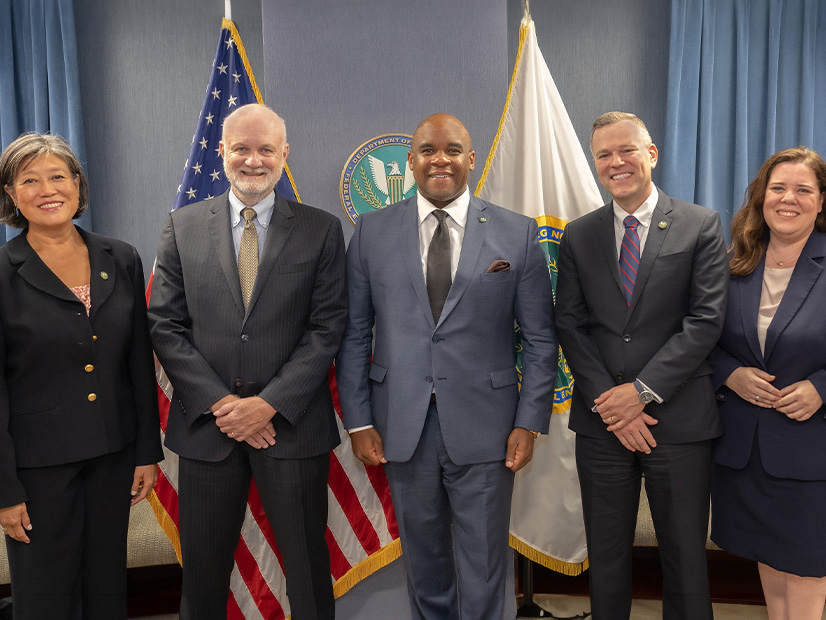
WASHINGTON — The ongoing debate around Order 1920 and its pending rehearing requests continued at FERC’s monthly open meeting July 25, a day after it came up at a House oversight hearing. (See related story, Order 1920 Debated at House Hearing with All 5 FERC Commissioners.)
Order 1920 came after Order 2023, which set new standards for interconnection queues, and Order 1977, which implemented FERC’s new backstop siting authority for lines in National Interest Electricity Transmission Corridors.
“I believe this suite of transmission reforms is balanced,” Chair Willie Phillips said. “And I believe it will give us what we so desperately need to meet the demand that we know is going up in our country; to bring all of those resources that we know are waiting in the wings.”
Phillips also noted that a group of state regulators from around the country supported Order 1920 in a letter to FERC this week (RM21-17).
But legal challenges to the order kicked off July 15 when FERC issued a notice that it had not acted within its 30-day statutory deadline for responding to rehearing requests. A group of Republican state attorneys general have filed an appeal of the rule with the 5th U.S. Circuit Court of Appeals — as have many other parties, including those that generally support it, in appellate courts around the country.
The commission did not say why it had not acted on the nearly 50 rehearing requests filed, but former Commissioner Allison Clements departed at the end of last month, and three new commissioners have joined since the order was issued in May.
One area even some supporters of the rule would like to see changed on rehearing is whether transmission providers should be required to file any alternative cost allocation schemes proposed by state regulators. Commissioner Mark Christie dissented from the order over the issue.
“We’ll respond to every single issue raised” in the rehearing requests, Phillips told reporters after the meeting. “To the extent that there are improvements that can be made to the rule, I look forward to working with my colleagues on what those might be. I think you hear me joke all the time that it’s a perfect rule, but I do believe that while it’s a great step forward, we’re just getting started. We can make improvements.”
Christie said ensuring FERC gets to rule on any cost allocation proposal from states is a change that should be adopted on rehearing.
“That ought to be one of the top priorities in amending because I think there’s going to have to be several major amendments to this rule to make it something that certainly would be acceptable to the states,” Christie said. “And I think that would just be one of the many issues that needs to be changed. And I would hope that there will be a majority on FERC amenable to making those major changes because, otherwise, this rule is not going to work.”
Phillips and Clements did not require any resulting state plans be filed in part because of a precedent in Atlantic City Electric Co. v FERC, they argued. Christie argued in the dissent that the case did not tie FERC’s hands that much.
An alternate interpretation is before the commission on rehearing, with the Harvard Electricity Law Initiative’s Ari Peskoe arguing that the precedent only stops FERC from forcing utilities to cede their rights to file rate changes under Federal Power Act Section 205.
“Atlantic City does not prevent the commission from amending the pro forma [Open Access Transmission Tariff] to include a process for filing all regional cost allocation methods approved by relevant state entities, regardless of the transmission provider’s approval,” Peskoe wrote in his rehearing request. “Imposing a process for filing relevant state entities’ cost allocation methods would not ‘deny [utilities] their right to unilaterally file rate and term changes.’”
Some state regulators have made similar arguments in their rehearing requests, noting that FERC has given their counterparts in SPP cost allocation filing rights.
But Christie also argued that additional changes would be needed for his support, including giving states the chance to approve the parameters and benefits used in the planning process. As written, he argued, the order will spread the cost of public policy lines to unwilling states, contrary to Phillips’ continued insistence.
Christie noted that MISO Independent Market Monitor David Patton has repeatedly criticized the RTO’s Long Range Transmission Planning process, which was cited as the model for Order 1920 by supporters. Patton argues that the LRTP consistently overstates benefits, which leads to too much transmission being built. (See MISO IMM Knocks LRTP Benefit Calculations, RTO Poised to Add More Projects.)
While Phillips and Christie have been engaged in an often-public debate on the merits of Order 1920, the majority on rehearing will include at least some of FERC’s three new members who are still getting up to speed on its voluminous record.
“The commission works best when we have five members,” Phillips said. “What that really means is that when you have five commissioners, they bring with them all of their history, all of their experience [and] all of their expertise to bear. And I believe you get a better result; you get better orders; you get better outcomes because of that diversity of opinion. And so, because we have five now, I think we will get an even better order on rehearing.”



